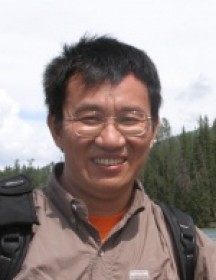
RI Seminar
March

3:30 pm to 4:30 pm
Event Location: NSH 1305
Bio: Zexiang Li attended the South-Central University in 1978, received his BS (with honor) degrees in Electrical Engineering and Economics from Carnegie-Mellon University in 1983, his MS degree in EECS in 1985, MA in mathematics and PhD in EECS in 1989, all from the University of California at Berkeley. He worked at ALCOA, the Robotics Institute of CMU and the AI Lab of MIT (89-90). He was an assistant professor at the Courant Institute of New York University (90-92). In 1992, he joined the Department of Electronic and Computer Engineering of the Hong Kong University of Science and Technology and is currently a professor of the department. He founded the Automation Technology Center(ATC) and currently serves as its director. Zexiang Li received the ALCOA Foundation Fellowship in 1979, and the E. Anthony Fellowship in 1983. He was a recipient of the University Scholar award from CMU in 1983, the E.I. Jury award from UC Berkeley in 1989, the Research Initiation award from NSF (US) in 1990, the Outstanding Young Researcher award (Class B) from NSF China in 2000, the LEAD award from AMI, USA in 2001, and the Natural Science award (3rd class) from China in 1997. He became an IEEE Fellow in 2008. Zexiang Li served as a panel member of the Hong Kong Research Grants Council (RGC), an overseas member of the Natural Science Foundation of China (NSFC), and an associate editor for the IEEE Trans. on Robotics and Automation. He was the general Chair for the 2011 IEEE International Conference on Robotics and Automation (ICRA). Zexiang Li’s research areas of interests include multifingered robotic hand, parallel manipulators, workpiece localization and inspection, motion control, precision assembly, and unmanned aerial vehicles (UAVs). He is the author of more than 100 journal and conference papers, and the books A Mathematical Introduction to Robotic Manipulation) (CRC Press 1993) and Nonholonomic Motion Planning (Kluwer 1994). Zexiang Li cofounded several companies with his colleagues and students from the Automation Technology Center, including Googol Technology, the first motion control company in China, iFlight Technology (or DJI) a leading company in UAV and flycam products and Lie Group Automation.
Abstract: Many problems in robotics, mechanism design and manufacturing research are geometric in nature: Rigid body motion, modeling, analysis and synthesis of both open-chain and closed-chain manipulators, grasping and manipulation with multifingered robotic hands, tolerance formulation and verification, design and control of five- axes machines, etc.In this talk, I will present an effort, which was initiated by R. Brockett of Harvard about 30 years ago, and continued by the Berkeley group and then my own group at HKUST for the last 20 years to develop a unified theory, using tools from differentiable manifolds and Lie groups, for robotics, mechanism design and manufacturing research. First, using intuitive examples, I will recollect some of the basic concepts of differentiable manifolds and their “engineering” classifications. Then, I will show how problems in robotics,mechanism design and manufacturing research can be modeled using various types of manifolds as
their model spaces. Finally, I will highlight how geometric properties of these spaces are being exploited to provide more efficient solutions for optimization problems defined on these spaces.
I will describe how results from this research program are being used as basis for founding of three companies, one in motion control, one in UAV-based consumer products and the other in assembly automation for 3C products. Burrowing from L. Page’s words, I credit this effort to “Geometry as inspiration.” There are grand opportunities for robotic research in China. However, the biggest challenge lies in the creation of an eco-system that foster growth of many more startups from our research and teaching programs. A new robotics institute is being proposed at HKUST for such a purpose.